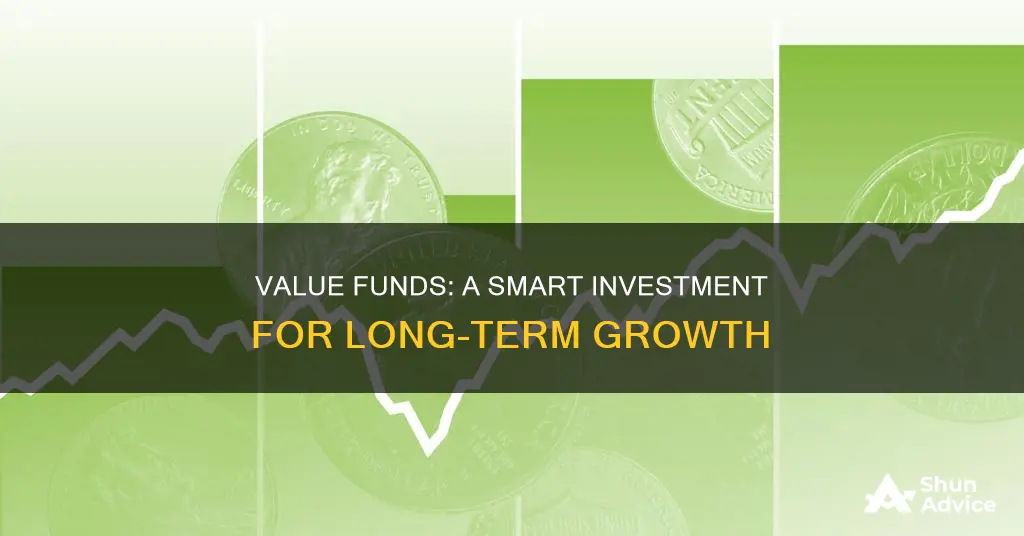
Value funds are investment vehicles such as exchange-traded funds (ETFs) or mutual funds that invest in a wide range of value stocks. Value stocks are those that are trading at a discount to their intrinsic value, or their expected future cash flows. Value funds are often synonymous with strategies developed by investors Benjamin Graham and Warren Buffett, who is one of the world's most successful investors. Value funds are typically used as long-term investing allocations that have the potential to grow steadily over time. They are a good way to get exposure to a range of value stocks, which can be a low-risk way to beat the market. Value funds also tend to be more stable than the broad market and are less likely to lose their value or have a sharp sell-off than growth stocks.
| Characteristics | Values |
|---|---|
| Risk | Value stocks are considered to have a lower level of risk and volatility as they are usually found among larger, more established companies. |
| Dividends | Value stocks often pay dividends as they are well-established companies with committed dividend distribution programs. |
| Performance | Value stocks have outperformed growth stocks over the long term, but growth stocks have been outperforming for the last 10 years. |
| Price | Value stocks are priced lower than the broader market. |
| Returns | Value stocks are currently undervalued and have the potential to generate superior returns. |
| Inflation | Value stocks have outperformed growth stocks in moderate and high inflationary environments. |
| Market participation | Value stocks benefit from broader market participation, with a larger variety of stocks driving market returns. |
What You'll Learn

Value funds are a good way to get exposure to a range of value stocks
Value funds are typically used as long-term investments that have the potential to grow steadily over time. They are a good option for investors who want to take a more hands-off approach to investing in value stocks. By investing in a value fund, you can gain exposure to a diversified portfolio of value stocks without having to research and select individual stocks.
Value stocks are considered to be stocks that trade at a discount to their intrinsic value or their expected future cash flows. They are typically well-established companies that offer investors dividend payments. Value stocks can be found in several key industries, including consumer staples, energy, financials, industrials, and materials. Examples of value stocks include Berkshire Hathaway, JPMorgan Chase, and Proctor & Gamble.
Value funds can be a good option for investors who are looking for a low-risk way to beat the market. When done right, value investing can provide strong long-term returns by identifying stocks that are trading at a discount or have a sustainable competitive advantage. Additionally, value funds are more likely to offer dividends or higher dividend yields compared to growth funds. They are also less likely to lose their value or experience a sharp sell-off during a bear market.
Overall, value funds offer a convenient and diversified way to invest in a range of value stocks. They can provide exposure to well-established companies, dividend payments, and the potential for long-term growth.
Bond Fund Investment: Where to Begin?
You may want to see also

Value investing can be a low-risk way to beat the market
The appeal of value investing lies in its potential to generate returns with lower risk. Value stocks are often associated with larger, more established companies, and even if they don't reach their predicted target prices, they may still offer some capital growth. Additionally, value stocks tend to pay dividends, providing a steady income stream. The strategy is favoured by successful investors like Warren Buffett, who has historically outperformed the market by identifying stocks with sustainable competitive advantages.
Value investing can be particularly advantageous during certain market conditions. For example, during a bear market, value funds tend to outperform as they hold profitable stocks that are less vulnerable to multiple compressions. Moreover, in a high-interest-rate environment, value stocks have historically outperformed growth stocks. This is because value stocks are typically found in sectors that are sensitive to economic swings, such as consumer staples, energy, financials, industrials, and materials.
However, it is important to note that the performance of value stocks can vary over time. While value investing outperformed in the first decade of the 2000s, growth stocks outperformed in the following ten years. Therefore, investors should be mindful of recent history and carefully consider the holdings of the value fund they are investing in. Nonetheless, value investing remains a compelling strategy for those seeking a potentially lower-risk approach to beating the market.
International Equity Mutual Funds: Diversify and Grow Your Wealth
You may want to see also

Value funds are more likely to offer dividends or higher dividend yields
Value stocks are considered to be stocks that trade at a discount to their intrinsic value, or their value based on their expected future cash flows. They are frequently well-established companies that offer investors dividend payments. As such, value funds, which are investment vehicles that own a wide range of value stocks, are more likely to offer dividends or higher dividend yields compared to growth funds.
Growth stocks, on the other hand, usually refrain from paying out dividends. Instead, they reinvest retained earnings back into the company to facilitate expansion. The probability of loss for investors with growth stocks can also be greater, particularly if the company can't keep up with growth expectations.
In summary, value funds are more likely to offer dividends or higher dividend yields because value stocks are typically well-established companies that are trading below their intrinsic value and have committed dividend distribution programs.
Mutual Funds: Smart Investment, Diversified Portfolio, and Profits
You may want to see also

Value funds are more stable than the broad market
Value funds are a good option for investors seeking a stable investment vehicle with the potential for steady growth over time. Compared to the broad market, value funds exhibit greater stability due to their focus on investing in undervalued stocks of well-established companies.
The underlying principle of value investing is to identify stocks that are trading below their intrinsic value, or the true worth of the company's underlying assets. By investing in such stocks, value fund managers aim to benefit from a future increase in the share price once the market corrects its inefficiencies and recognises the true value of these companies. This strategy is associated with due diligence and patience, making value funds a more stable investment choice.
Value stocks are typically associated with larger, more established companies that have solid financials but may be undervalued due to temporary factors such as public perception or short-term news. These stocks often offer dividend payments, providing investors with a source of income even if the share price does not increase as anticipated. The focus on established companies and dividend-paying stocks contributes to the overall stability of value funds.
Additionally, value funds have a history of outperforming the market during economic downturns, such as bear markets and recessions. They tend to hold profitable stocks and are less vulnerable to multiple compression, as value stocks are already traded at low valuations. This makes value funds a more stable option during volatile market conditions.
It is important to note that while value funds offer stability, they may underperform the market over certain periods. For example, during times of economic expansion and bull markets, growth stocks tend to excel while value stocks may lag. Therefore, investors should consider their risk tolerance, investment goals, and market conditions before deciding between value and growth funds.
Artificial Intelligence: Mutual Funds for Future Tech Investors
You may want to see also

Value funds tend to outperform in a bear market
The Nature of Value Funds
Value funds are investment funds that focus on identifying and investing in stocks that are considered undervalued or trading below their intrinsic value. This strategy, known as value investing, is often associated with long-term investing and requires investment due diligence and patience. Value funds are typically comprised of well-established companies that offer dividend payments to investors.
Outperformance in Bear Markets
In a bear market, when stock prices are generally declining, value funds have the potential to outperform other investment strategies. This is because value funds target stocks with strong fundamentals that may be temporarily undervalued due to market inefficiencies. Once the market corrects these inefficiencies, the value investor stands to benefit from an increase in the share price.
Contrasting Growth Investing
Value investing can be contrasted with growth investing, which focuses on emerging companies with high growth prospects. Growth stocks are often more susceptible to falling sharply in a bear market, as they are richly valued based on future profit expectations. On the other hand, value stocks may outperform during a downturn because of their lower price-to-earnings ratios and perceived earnings stability.
Historical Performance
Historically, value stocks have outperformed growth stocks during bear markets. For example, during the 2008 financial crisis, value stocks fell but not as much as growth stocks, and they also offered dividends, which became more valuable relative to the money invested when equity growth stalled or declined. Similarly, during the COVID-19 pandemic, value stocks outperformed growth stocks as the market rebounded from a sharp decline.
Factors Favouring Value Stocks
Several factors can favour the performance of value stocks in a bear market. These include moderate to high inflation, a favourable macro environment, and broader market participation beyond a narrow set of stocks. Additionally, sectors such as consumer staples, utilities, and healthcare tend to be more defensive and outperform during bear markets, and value funds with holdings in these sectors may benefit.
Risk Considerations
While value funds have the potential to outperform in a bear market, investing in any stock carries inherent risks. It is challenging to time the market correctly, and selling during a downturn may cause investors to miss out on sharp rallies that typically mark the end of a bear market. Therefore, it is crucial for investors to carefully consider their investment objectives, risk tolerance, and time horizon before making any investment decisions.
Smart Strategies for Choosing the Right Mutual Fund
You may want to see also
Frequently asked questions
Value funds are a good way to get exposure to a range of value stocks. Value stocks are considered to be stocks that trade at a discount to their intrinsic value, or their value based on their expected future cash flows.
Value investing, when done right, can be a low-risk way to beat the market. Value funds are also more likely to offer dividends or higher dividend yields, and they are less likely to lose their value or have a sharp sell-off than growth stocks.
Examples of value funds include the Vanguard Equity-Income Fund Investor Shares (VEIPX), the ClearBridge Large Cap Value Fund (SAIFX), the Invesco S&P 500 Enhanced Value ETF (SPVU), and the iShares Edge MSCI USA Value Factor ETF (VLUE).
Value funds have underperformed the S&P 500 and growth funds over the last decade. It's important to be mindful of the recent history and understand the holdings of the value fund before investing.







